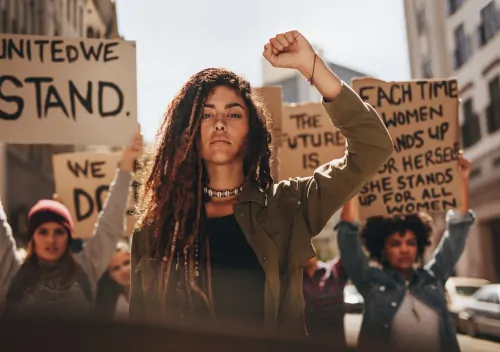
In 1992, 47 women were elected to the House of Representatives and 24 were elected to Congress. People called it “the Year of the Woman” in Washington. A lot has changed since then.
In 2018, women are doing even more. Not only are they breaking records and beating men in the primaries—from state legislatures to governorships to Congress—they’re igniting global movements and trailblazing their own path into history books as world-changers. They’re holding men accountable for their actions and they’re taking the reins for female progression.
Late 2017 and the beginning of 2018 established something the world had never seen before. The #MeToo movement (which has roots in activism dating back to 2007) spread and brought justice to the likes of Hollywood, corrupt politicians and even powerful members of the Church, giving women across the world the power and confidence to stand up and speak out against sexual violence.
There are some accusations that women are only rising to the political occasion to oppose President Trump, but that’s not the case. Women are rising for change and respect. The #MeToo movement was not just about shaming or banishing men who need to be held accountable. It was about assembling a community of survivors to heal, build up women to support each other and use those supportive communities to enact change.
Which brings us to today.
According to analysis from the Center for American Women and Politics (CAWP) at Rutgers University, there are 235 women running as nominees for U.S. House seats and 22 women for U.S. Senate seats, which breaks records set in 2016 and 2012. The number of female congressional candidates has increased by 44% since 2012, and women of color running for office have increased by 75 percent.
For many of these women, according to CBS News, running for office is a first. Almost half of the country’s states have never sent a woman to the Senate, and five states have never had a woman represent them in the House of Representatives.
Looking to the Scriptures, very few women rose to positions of leadership. In Judges 4, Deborah stands out as the only female judge who served during extended years of turmoil and hardship. Deborah was chosen by God for a reason. She became a leader based on her merit, not solely her womanhood.
In the past, many women candidates have been accused of using gender as a crutch, as if they had nothing to offer voters besides not being a man. But a quick survey of this year’s candidates shows that’s just not the case. Their strengths and life experience are multitude. A breastfeeding mom. Female veterans. A rock-climber. Muslim-American women wearing hijabs. A woman who protected herself from domestic abuse as an 11-year-old. A Korean-American woman in California. Even a Catholic socialist.
Mark Putnam, a veteran ad maker, told USA Today, “Voters want to be reassured that you understand their lives, but they also want to know you’re going to stand up for them.”
At this point, even if the record number of women running doesn’t translate to new seats, the attention women are garnering for the political agenda is bound to have some long term effects. Debbie Walsh, director of Rutgers CAWP said, “To me, women win [just by running], whether she actually wins or not.”
So 1992 was deemed “The Year of the Woman.” But in some ways, the Year of the Woman never really ended. In some ways, it’s just getting started.























